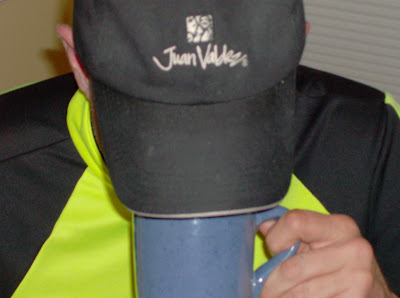
There is something new in our understanding of the effects of caffeine on athletic performance!
Caffeine intake after exercise in addition to carbohydrate consumption boosts the rate of muscle glycogen re-synthesis, thereby speeding recovery, according to a team of Australian researchers. Muscles store energy in the form of glycogen for future use. The application of this knowledge would provide endurance athletes who compete on successive days an obvious advantage.
The article which appeared in the Journal of Applied Physiology in June 2008 indicates that subjects who consumed both carbohydrates and caffeine after exhaustive exercise rebuilt 66% more new muscle glycogen than subjects who consumed just carbohydrate and no caffeine. The dramatic effect was seen after only four hours of recovery.
Our readers know that writers here at RTP have unabashedly extolled the virtues of caffeine. We’ve known for some time based on hundreds of studies that caffeine can boost athletic performance. Thus the pre-ride cup of coffee and the caffeinated gels and other fixes during the ride. Now, thanks to our Aussie friends, we have one more reason to continue celebrating caffeine even after the ride. And that ain’t no hill of beans!
As with most scientific studies, there are some caveats. Obviously, some people do not tolerate caffeine. Additionally, the dosage—8mg caffeine/kg body wt—amounts to the equivalent of five cups of coffee for an “average-size” person, according to the lead researcher. The question is whether similar results can be achieved with less caffeine, something the researchers will be addressing.
One strength of the study was the use of trained athletes as subjects. Moreover, an underlying mechanism was suggested, a calcium-dependent enzyme which speeds glucose transport into muscle. For those interested in the actual study, the reference is: Pederson, D.J. (May 8, 2008). High rates of muscle glycogen resynthesis after exhaustive exercise when carbohydrate is co-ingested with caffeine. J Appl Physiol.
Caffeine intake after exercise in addition to carbohydrate consumption boosts the rate of muscle glycogen re-synthesis, thereby speeding recovery, according to a team of Australian researchers. Muscles store energy in the form of glycogen for future use. The application of this knowledge would provide endurance athletes who compete on successive days an obvious advantage.
The article which appeared in the Journal of Applied Physiology in June 2008 indicates that subjects who consumed both carbohydrates and caffeine after exhaustive exercise rebuilt 66% more new muscle glycogen than subjects who consumed just carbohydrate and no caffeine. The dramatic effect was seen after only four hours of recovery.
Our readers know that writers here at RTP have unabashedly extolled the virtues of caffeine. We’ve known for some time based on hundreds of studies that caffeine can boost athletic performance. Thus the pre-ride cup of coffee and the caffeinated gels and other fixes during the ride. Now, thanks to our Aussie friends, we have one more reason to continue celebrating caffeine even after the ride. And that ain’t no hill of beans!
As with most scientific studies, there are some caveats. Obviously, some people do not tolerate caffeine. Additionally, the dosage—8mg caffeine/kg body wt—amounts to the equivalent of five cups of coffee for an “average-size” person, according to the lead researcher. The question is whether similar results can be achieved with less caffeine, something the researchers will be addressing.
One strength of the study was the use of trained athletes as subjects. Moreover, an underlying mechanism was suggested, a calcium-dependent enzyme which speeds glucose transport into muscle. For those interested in the actual study, the reference is: Pederson, D.J. (May 8, 2008). High rates of muscle glycogen resynthesis after exhaustive exercise when carbohydrate is co-ingested with caffeine. J Appl Physiol.


Good to know, but not exactly a great way to relax after an evening ride.
ReplyDeleteThanks for the insight, Joe---a case of an upper being a downer. The application of science to practice is not always straightforward. Shall we say that some individuals will be able to take advantage of this fact in some instances.
ReplyDeleteDean/Raleigh
Hey Dean,
ReplyDeleteIf you want to get a "study group" going, I'll volunteer!
Branson
Thanks, Branson! You've already contributed the experimental design: "Ride. Eat. Sleep!"
ReplyDeleteAs the cycling community becomes aware of these findings, it will be interesting to hear from individual riders who have experimented with caffeine in this fashion.
Some of the subjects in the scientific study I quoted, had trouble sleeping after imbibing caffeine, while others did not.